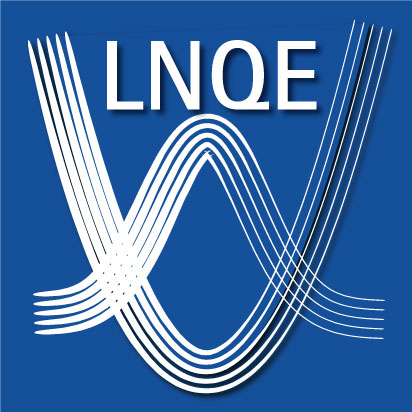On April 10, 2024, Lower Saxony's new location for technology transfer in quantum technologies was opened in the former Rolleiwerke Braunschweig: The HighTech Incubator of Quantum Valley Lower Saxony (QVLS-HTI). On around 500 square meters of new office and laboratory space, start-ups, excellent research institutions and, in future, established companies will come together for a continuous exchange of ideas. The QVLS-HTI combines funding from the federal government (Federal Ministry of Education and Research) and the state (Lower Saxony's Ministries of Science and Culture and of Economic Affairs, Transport, Building and Digitalization) as well as the scientific expertise of the Physikalisch-Technische Bundesanstalt (PTB), the Technische Universität Braunschweig and Leibniz University Hannover (LUH) to provide a strong impetus for the region.
Thanks to initial funding for high-tech incubators in Lower Saxony amounting to over 4 million euros, 11 start-ups are already associated with the QVLS-HTI. The QVLS-HTI builds on a long industrial tradition in the former Rollei factories: Where world-famous cameras rolled off the production line almost 100 years ago, young talents such as the spin-off QUDORA, a spin-off of PTB and LUH, are now working on the chip of the Lower Saxony quantum computer. To enable start-ups like QUDORA to demonstrate their technological maturity, the HTI has invested 1.5 million in technical equipment for the site. In addition to a DeepTech makerspace including 3D printers, the focus is on sensitive quantum optical experiments.
Long-term location for technology transfer
Two major projects of the Lower Saxony Quantum Valley Lower Saxony Alliance are involved in the constant success of the QVLS HighTech Incubator. Funding from the state and federal governments is intertwined here to leverage the future potential of quantum technologies in a region with a strong research and economic base:
With a total of 25 million euros from zukunft.niedersachsen, the funding program of the Lower Saxony Ministry of Science and Culture and the Volkswagen Foundation, the QVLS-Q1 project for the realization of a quantum computer will be supported for five years until 2025. Since 2022 and until the end of 2024, the Ministry of Economic Affairs, Transport, Building and Digitalization of Lower Saxony has provided the necessary funds for the QVLS-HTI. With 4.1 million euros, the state is supporting the founding and further development of a total of 11 quantum technology start-ups that are bringing the region's scientific excellence to the market. Launched in 2022, the incubator was designed from the outset to provide young deep-tech companies with shared premises, which are now being opened in the Rolleiwerke. Integrated into the Quantum Valley Lower Saxony ecosystem, the focus here is on ongoing technology transfer
The state's joint start-up funding in the areas of science and industry has now resulted in federal funding. From January 2025, the QVLS-HTI will be the new hub for the future cluster QVLS iLabs, which is being funded by the Federal Ministry of Education and Research with around 15 million euros in the first phase. In the future cluster, science, industry and politics are working together to develop the enormous opportunities offered by quantum technologies in Lower Saxony. The high-tech incubator will then open up to other start-ups and companies that are pushing the boundaries of physics to master the challenges of the future. While start-ups stand for innovative ideas and impulses, companies with larger capacities are often needed to scale these ideas. The iLabs ensure long-term collaboration from the development of key technologies to application and product development.
State Secretary at the Federal Ministry of Education and Research Prof. Sabine Döring: "Quantum technologies are key technologies of the future with enormous potential for our society and economy. Their possible applications range from the quantum computer-assisted design of new active substances to tap-proof communication. In order to make this potential and the great opportunities of the technology a reality, the German government is providing around three billion euros together with the scientific organizations. Quantum Valley Lower Saxony and the future cluster QVLS-iLabs are extremely important for this. Together, we are building an innovation ecosystem with a bright future. Start-ups play a central role in this. In the newly opened High Tech Incubator, they will receive the support they need to succeed in the international innovation competition."
Lower Saxony's Science Minister Falko Mohrs: "The QVLS HighTech Incubator is a great success for Lower Saxony as a science location: the fact that the start-up funding from the state has resulted in this important support from the federal government demonstrates the relevance of our research beyond Lower Saxony. The QVLS HighTech Incubator is an example of how basic research and start-ups in the field of quantum technologies are an ideal match and how targeted collaboration offers great prospects for the transfer of young scientific fields to society and industry."
Lower Saxony's Economics Minister Olaf Lies: "Our special program has put the QVLS-HTI in a position to actively support start-ups in quantum technology. The potential of our start-ups in Lower Saxony is immense. We are hopefully on the verge of groundbreaking developments in the fields of electrical engineering, laser technology and measurement technology. With the funding from the state and federal government as well as the outstanding support of regional players, the QVLS-HTI will gain great appeal far beyond the region and Lower Saxony."
LUH professor and QVLS spokesperson Christian Ospelkaus: "Leibniz University Hannover, TU Braunschweig and the Physikalisch-Technische Bundesanstalt have been working together intensively in the field of quantum technology for many years. In research collaborations such as the QuantumFrontiers Cluster of Excellence, more than 400 scientists are conducting world-renowned cutting-edge research. With the QVLS HighTech Incubator, we now have a unique location in Lower Saxony to bring the results of our basic research into application together with partners from industry."
Note to the editors:
For further information, please contact Mechtild Freiin v. Münchhausen, Head of the Communications and Marketing Department and Press Officer at Leibniz University Hannover, on 0511 762-5342 or by e-mail at kommunikation@uni-hannover.de.










![[Translate to English:] Logo Zusammenland farbig](/fileadmin/_processed_/a/9/csm_zusammenland_4c_e78505eb7d.png)
![[Translate to English:] Logo Zusammenland-schwarzweiß](/fileadmin/_processed_/1/2/csm_zusammenland_sw_f06954e75c.png)